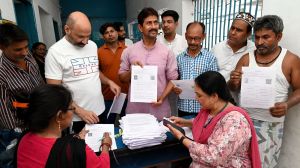UP liquor barons battle govt over license system
Lucknow, January 22: It’s a battle over booze that promises to get headier. The Uttar Pradesh government wants to intro...

Lucknow, January 22: It’s a battle over booze that promises to get headier. The Uttar Pradesh government wants to introduce a license system in the sale of country and India Made Foreign Liqour (IMFL) to replace the existing auction process. But a powerful, well-connected liquor lobby is closing ranks to stymie the government’s efforts well ahead of the auction, to be held in March.
Liquor barons are still reeling from the UP government’s “beer experiment”, which dented their monopoly. Now, they’ve warned that they won’t go in for bids at the annual auction unless the government withdraws its beer policy.
The liquor trade in Uttar Pradesh is the preserve of just four to five families, a syndicate that can exert ample pressure by collectively opting out of bidding in the auction. In the past, the government had to fall in line since it gets a whopping Rs 1,800 crore revenue from the auction. But bolstered by the success of the “beer experiment”, it may just make the going tough for the syndicate this time round.
The state excise department opened the sale of beer to all last year, and beer shops that had nothing to do with the syndicate sprung up. The government earned a pile from this move: Rs 48 crore from the sale of beer alone so far, compared to Rs 10 crore last year. The government also expects to earn Rs 60 crore more within the next two months.
“The decision didn’t just deal a blow to the liquor lobby, but it’s also helped consumers. Now, the same product is available at almost half the price. Before the experiment, a bottle of beer cost Rs 65; now, it costs Rs 35,” said a senior excise department official.
Interestingly, some of the syndicate’s members are part of the UP government: Jitendra Jaiswal, son of liquor baron Badri Jaiswal, is a minister in the Rajnath Singh government. As is Sangram Singh. Jawahar Jaiswal, who has a monopoly in liquor sales in at least 18 districts is the Samajwadi Party MP, while Dharam Pal Yadav is a Rajya Sabha MP who has formed his own outfit.
In fact, Jay Prakash Jaiswal used his considerable financial clout to swing a victory in the council elections despite being an independent.



- 01
- 02
- 03
- 04
- 05




























